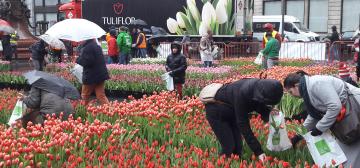On Saturday 20 January, Antwerp, the world’s diamond capital, replaced the stones of the Astridplein with a garden of 100,000 tulips to be freely picked. Visitors were invited to pick a bouquet of tulips free of charge, all offered by VLAM and the Flemish producers.
It was the first time that VLAM and the Flemish ornamental plant producers organised this garden and they treated all the passers-by to a bouquet of 15 colourful tulips of their own choice, with bulb. This event underlined the beneficial effect of flowers and plants and at the same time demonstrated that Belgium has a fine range of tulips to offer. Approximately 60 million tulips are produced in Belgium every year.
There are ten tulip-growers in Belgium. The Tuliflor company specialises in tulip cultivation and is the only firm to engage in tulip production throughout the year. And it was this company that supplied the 100,000 tulips in Antwerp. Its annual production of about 40 million items makes Tuliflor the largest tulip producer in Belgium and a major player on the European market. They export 27 to 30 million tulips worldwide every year. Christophe Pieters, the owner of Tuliflor, says: ‘When you talk about tulips, we immediately think of the Netherlands, but we also produce a decent number in Flanders. We mainly force fatter bulbs than our Dutch counterparts. This results in more solid stems and larger flowers that can be kept longer.’
Flemish cut flowers: a colourful mixture
Flanders has 38 producers of cut flowers, amounting to a production area of 60 hectare. In addition to colourful tulips, Flanders produces a fine range of cut flowers. There is f.i. the classic rose, the flamboyant amaryllis, the frivolous carnation and the elegant lily. These cut flowers are either sold direct to retailers, or are marketed through the auctions in Brussels, the Netherlands and Germany. Belgian cut flowers are after all much loved by clients abroad, and are destined mainly for the Netherlands, France, Germany and the United Kingdom.







